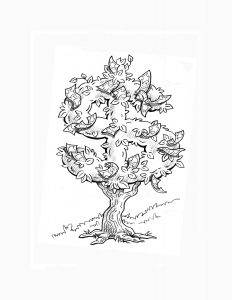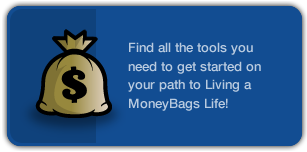Category Archive: MoneyBags Mission
-
It is Tax Time……..I mean Spring Time
Comments Off on It is Tax Time……..I mean Spring TimeFor most people this time of year always makes them happy, since they know that summer is around the corner. However, for me, I don’t start celebrating until after tax day (April 15th – unless there it falls on a weekend or a holiday).
So, since it is Tax Time, take a minute to teach your kids about money and taxes. As stated in Chapter 11, one of the fastest ways for kids to understand the impact of taxes is for you to take some “taxes” out of their food with a big bite for the provider (you).
Furthermore, explain where money comes from and that it does not grow on trees (Chapter 47), which was my favorite dream. Consider kicking spring off with some MoneyBags fun by creating a Money Tree. Erect it up on Aril 2nd (the enactment of the 1792 Money Law), decorate it and then take it down on Tax Day!
Make sure to post a pic of your Money Tree on Facebook, I would love to see it.
Here is to filling your MoneyBags!
Wendy
-
The Importance of Using Cash
Comments Off on The Importance of Using CashI watched a fabulous documentary called “(Dis) Honesty: The Truth About Lies” featuring Professor Dan Ariely’s lifelong work. Many great insights came out of his research, one of which is that dishonesty grows the further one is away from actual money.
In the documentary, Professor Ariely performs a matrix study which has people take a test where compensation is received at the end based on the honor system. The subjects take a test and are given the key to the test so they can see and report how many questions they answered correctly. The subject was then asked to shred their test and answers (or so they think). Once their test was “shredded” they then proceeded to a test monitor to report how many answer they got correct and then rewarded with money accordingly (i.e. the more correct answers, the more money they received for their time). In this study, they found that people “fudged” their results by one or two answers. If they had four correct, they likely reported six.
He then does the same matrix study, but this time after shredding their test instead of proceeding directly to the monitor for cash, they were given poker chips. Then, they would proceed three feet away to the “cashier” to turn their poker chips in for cash. What he found was that this ever so slight distancing from the money doubled the “fudge factor” in how many correct answers people were willing to report. If they had four correct, they were now willing to “fudge” more and report eight correct answers.
So, he tries the study one more time, but this time, he has people do a pre-test of writing down as many of the Ten Commandments as they can remember, or swear on a Bible. In this scenario, the number of people being honest in their reported test results increased to 100%! He even tested people of other religions and atheists to see if it would yield similar results, and the results held true. The conclusion is that a simple reminder of one’s own general moral code will lead to more honest behavior bmmhzdx.
Professor Ariely’s study shows that being reminded of moral behavior and keeping it top of mind can have huge impact on behavior. As an example, one country made one small change on the letter they sent out to collect back taxes. The simple little line of “nine in ten people pay their taxes on time” increased their collection rate by 5%, which sounds like a nominal number, but for a large country it means big money!
Thus, your MoneyBags Mission is to share this blog’s link with a friend and then watch Professor Ariely’s documentary “(Dis) Honesty: The Truth About Lies” with your kids. The program is currently on Netflix or is available for download on iTunes, GooglePlay or Vimeo. After watching, discuss as a group what the implications of this research means for your family as well as each individual and how it might influence your behaviors toward money as we use more debit, credit and online currencies. Perhaps you can come up with your own family’s Code of Honor to keep in your wallets, backpacks and hang on a wall. The Family Code of Honor will be a good nudge to remind everyone to always be honest and use good financial sense.
Here is to filling your MoneyBags!
Wendy
-
We Made Our Goal! Speaking of Goals…
Comments Off on We Made Our Goal! Speaking of Goals…<a href="http://moneybagslife click resources.com/wp-content/uploads/2015/01/MB-New-Years-.jpg”>

Thank you all! Thanks to you, MoneyBags reached its goal of 200 Facebook Likes by midnight on December 31, 2014! This shows the power of goal setting. With that in mind, the following statistics from Personalplan.com1, quoting a Harvard Business study, sheds light on the power of goals.
- 83% of the population does not have goals
- 14% have a plan in mind, but are unwritten goals
- 3% have goals written down
The study found that the 14% who have goals are 10 times more successful than those without goals. The 3% with written goals are 3 times more successful than the 14% with unwritten goal.
When thinking about goals, Dr. Edwin Locke’s theory of SMART goal setting is quite valuable and can help you create your goals. Under his theory, your goals should be Specific, Measurable, Attainable, Relevant, and Time sensitive.
So, in 2015, here is your MoneyBags Mission: Welcome 2015 by thinking about what financial goals you would like to accomplish and write them down SMART-ly. Then, talk to your kids about setting up and writing down their SMART goal for 2015! Don’t forget to check in on your goals periodically throughout the year to see where you are in accomplishing them.
Here is to filling your MoneyBags!!!1http://www.personalplan.com.au/2_PersonalPlan/Goal_setting_Facts/index.html




